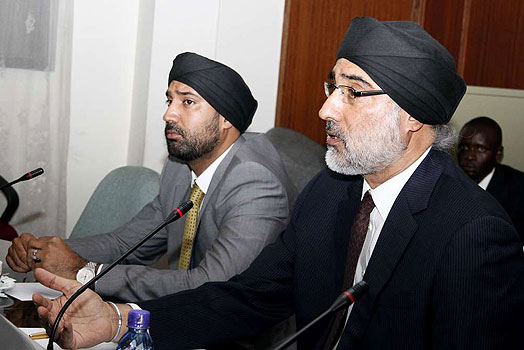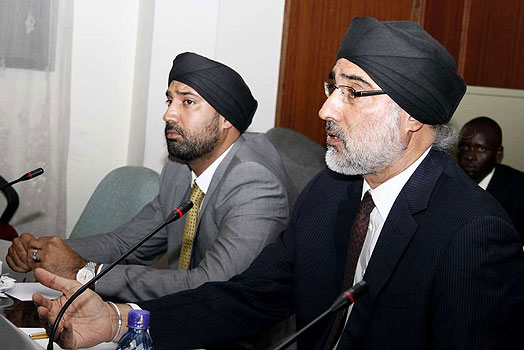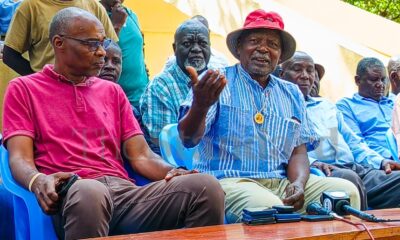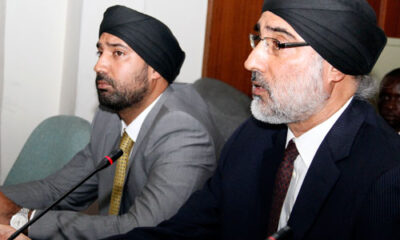Opinion
Sugar Millers With Questionable Traits Should Be Axed

Most of the sugar millers have failed to put in place cane development programmes in collaboration with contracted cane farmers in the designated areas as clearly stipulated by law
Majority of sugarcane milling companies in western Kenya should have their operational licenses revoked by the government for completely failing to adhere to the requirements demanded of them when they were issued.
Most of the sugar millers have failed to put in place cane development programmes in collaboration with contracted cane farmers in the designated areas as clearly stipulated by law, a requirement when they made the applications.
It is also indeed a statutory requirement that millers must prove to the Agriculture, Fisheries and Food Authority (AFFA) and particularly the regulatory authority , Sugar Directorate that they are actualizing this requirement on the ground for them to retain the milling licenses. On the contrary what is currently happening on the ground is the fact that sugar development programmes across the counties in western Kenya have been abandoned by millers – thus leaving vulnerable cane farmers at the mercy of predatory and scavenging operatives in the name of brokers.
The worst aspect of the whole imbroglio is that most of farmers cannot afford on their individual self the costs of executing the sugarcane development programmes, most operate on small farms. Land preparation, seed planting, and crop husbandry to maturity, harvesting and transportation to the factories is an expensive afire.
The legal requirement is that millers must invest in sugarcane development programmes in collaboration with farmers after which they recoup their investment costs from farmers’ earnings after delivery of mature crop for processing. These costs include land preparation, seed, farm inputs like fertilizers, harvesting and transport costs among others.
Millers most often deduct their dues soon after the crop is delivered at the factory for the first, second and third harvests and in many cases leave many farmers with nothing in what is popularly known on the ground as DRs.
In essence this means that cane farmers are the ones who end up financing the entire development programme with loans from the millers.
At the moment it is clear that millers like West Kenya in Kakamega County with subsidiaries like Olepito Sugar in Busia County, and Sukari Millers in Migori are leading the pack of millers without any sugar development programmes to their credit. The question is where are they getting the cane from to keep afloat and claim that they are the leading producers in the country? What is their role in the nearly ten years old sugarcane poaching crisis in the country and what has AFFA done to keep it in line?

West Kenya Sugar Company chairman Jaswant S. Rai (right) and managing director Tejveer Rai (left) during a parliamentary joint committee hearing.
The Rai family owner milling firm has been in the receiving end over links to contraband sugar smuggling.
In 2018, West Kenya Sugar Company and Eastleigh-based Diamond Wholesalers traded blame over the origin of 1,200 tonnes of contraband sugar seized at the latter’s warehouse.
While appearing before a joint committee of Parliament, West Kenya termed the Kabras branded sugar as “fake,” but Diamond Wholesalers claimed it bought the impounded sweetener from West Kenya.
Kabras brand is produced by West Kenya. Diamond Wholesalers have previously been linked to sugar smuggling in Mumias factory collapse in cohorts with Evans Kidero. West Kenya, which produces the popular Kabras Premium White Sugar and Kabras Brown Sugar, is among company’s whose brands have been linked to the illicit sugar which is said to have found its way to the shelves. Like in Mumias, West Kenya has been accused of smuggling sugar and repackaging to Kabras brand.
The other millers who are flouting the sugarcane development programmes whose licenses must be put on the chop include Butali in Kakamega county, Nzoia in Bungoma, Chemilil and Muhoroni in Kisumu, Sony in Migori and Mumias Sugar, who should be forgiven at the moment as they put their house in order, it was the best miller in organizing, maintaining and executing these programmes before its collapse.
The biggest irony is the fact that another milling company which was diligent in executing these programmes in collaboration with its contracted sugarcane farmers is Soin in Trans-Mara County whose operations have since collapsed leaving farmers stranded with huge quantities of the raw material on their farms.
This messy state of affairs has since seen many of these millers smuggling the raw material cheaply from Uganda and even Tanzania to keep factories stay afloat. They have also turned to predatory brokers who buy the raw material at throw away prices from desperate cane farmers in the country for as little as Ksh.. 1, 500 to 2500 a ton to sell it to the millers at Ksh. 3, 500 instead of the official Kshs. 3, 840 for the same. The farmers are being grossly exploited and many of them may abandon cane farming altogether as it happened to cotton farming in the late 1970s to early 1980s.
Production of sugar in Kenya is currently dominated by privately owned sugar millers led by West Kenya Sugar Company which has a 30.1 percent share of the market.
It is followed by Sukari factory at 21.4%, Butali Sugar mills at 17.7%, Transmara sugar at 5.2%, Nzoia sugar at 5%, south Nyanza Sugar at 4.4%, Muhoroni Sugar at 3.7%, Mumias Sugar at 1.9% and Chemelil Sugar at 1.1%.
In 2015, Mumias sugar was the market leader in terms of sugar production. However, private sugar millers have continued to take the lead with former market leaders and state-owned millers performing dismally.
Kenya Insights allows guest blogging, if you want to be published on Kenya’s most authoritative and accurate blog, have an expose, news TIPS, story angles, human interest stories, drop us an email on [email protected] or via Telegram
-

 Business3 days ago
Business3 days agoCooking Fuel Firm Koko Collapses After Govt Blocks Sh23bn Carbon Deal
-

 Business2 days ago
Business2 days agoABSA BANK IN CRISIS: How Internal Rot and Client Betrayals Have Exposed Kenya’s Banking Giant
-

 Business1 week ago
Business1 week agoMinnesota Fraud, Rice Saga, Medical Equipment Deal: Why BBS Mall Owner Abdiweli Hassan is Becoming The Face of Controversial Somali Businessman in Nairobi
-

 Politics1 week ago
Politics1 week agoYour Excellency! How Ida’s New Job Title From Ruto’s Envoy Job Is Likely to Impact Luo Politics Post Raila
-

 News1 week ago
News1 week agoKenya Stares At Health Catastrophe As US Abandons WHO, Threatens Billions In Disease Fighting Programmes
-

 News2 weeks ago
News2 weeks agoDCI Probes Meridian Equator Hospital After Botched Procedure That Killed a Lawyer
-

 Politics2 weeks ago
Politics2 weeks agoJaramogi Clan Tells Raila Jr, Winnie Against Disrespecting Their Uncle Oburu, Warns of Curses
-

 Americas2 days ago
Americas2 days agoEpstein Files: Bill Clinton and George Bush Accused Of Raping A Boy In A Yacht Of ‘Ritualistic Sacrifice’
















